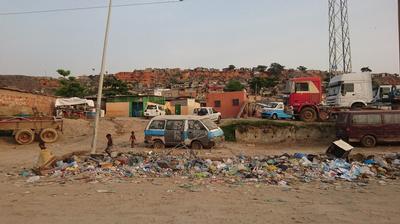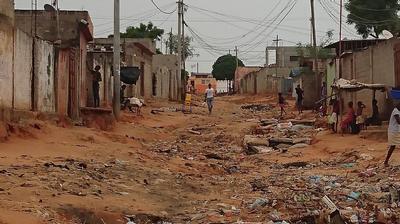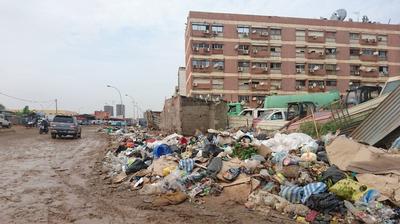Angola from boom to bust – to breaking point
If you ever wondered what a sustained 15 per cent annual growth rate might look like, you should have seen the changes in Luanda in 2002 and come back a long decade later. Between 2002-14 more than 450 billion petro-dollars (!) entered the state coffers, and Luanda transformed in a blistering speed. Unfortunately, after 2014, the many weaknesses of the Angolan development model – essentially a full-speed spending of oil rents – have cracked. In so many places, the cracks literally “let the gutter out”.
One thing, above all else, invades the eyes and nose of a visitor, and eats into the health and happiness of the city-dwellers: Litter and garbage. It is everywhere, even downtown and around the skyscrapers, in huge piles. It is worse still in the musseques, the surrounding poor areas. Garbage characterised the city when I first saw it in 2002. It did get better, but now it is back. Local government officials in Cacuaco, a Luanda suburb, admitted that the last time they paid the garbage collector companies was five months ago. Without local tax income, the local government can do little as the transfers from the central level dries up.
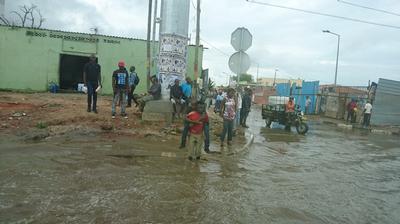
The "mini-golden age"
Two years ago, it all seemed so different. The new skyscraper skyline of Luanda was always the most spectacular physical manifestation of sustained growth in Angola, but behind it, a new city of offices, warehouses, shopping centres and apartment blocks appeared. During the Angolan "mini-golden age" from 2003-2008, as leading economist Alves da Rocha called it, the city sucked in a million foreigners that wanted a piece of the oil generated wealth. The credit-for-oil agreements with Beijing brought in Chinese construction companies and several hundred thousand Chinese builders. Just as many or more Portuguese and Brazilian nationals came as consultants and managers in trade and finance – and again, more construction. European and American oil companies set up their gated compounds in the outskirts of the city.
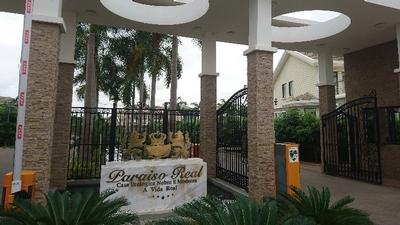
In between, the Angolan nouveau rich class, all tied to the ruling party, settled. All these people had a spending power hardly ever seen before in an African city. That was visible in the luxury shops, hotels and in the fancy restaurants of Luanda – but first and foremost in the housing prices that gave fame to Luanda as one of the world's most expensive cities. Not few were mesmerised by the dynamism of what happened – also because it was obvious that a good portion of the city now lived much better than ever before.
However, there was no lack of concerned voices warning of the dangers ahead. The city grew from around 2-3 million to 7 million people in about 15 years. It all just seemed to lack balance and adequate planning. Several new apartment blocks were recently built on sand-fills in the Luanda bay. Counting in the shocking and blatant corruption, plain to all who come close to the system, one could not but feel that it was all a construction on sand.
Bust followed boom
Crisis has hit Angola hard after the oil prices fell dramatically in late 2014. By early 2015, the first signs of the fiscal stress on the state started to affect the "real economy", and it rapidly got worse. The all-important public splashing of the oil rents dried up. Soon companies were not paid, workers laid off, and public services ground to a halt. When the government cut fuel subsidies, private and public transport immediately became a lot more expensive. By early 2016, it was clear that most of Angola's young population had never experienced such an economic crisis. People talked about "the crisis" (a crise) in most any conversation. We were struck by the rapidity at which the crisis had hit the lives of ordinary people.
“We are only here to manage the crisis”
Far from seeing the crisis as an opportunity, most people accepted that the "party was over". In government offices, many simply said that ‘all we can do is to manage the crisis’ – meaning that there is no room even to think about improvements. Yet underneath the resignation, the tension of anger could be felt everywhere. People directed it at the government for having mismanaged the country's economy. It seemed as if for every Facebook-comment positive to the government, a thousand lashed out against it in indignation and anger. No one blamed the Portuguese except ridiculous editorials in the Jornal de Angola – popularly known as Angola’s Pravda – and no one blamed the oil price except the Government. Most people, independently of their education levels, seemed to "know" that after boom comes bust and blamed the government for its failure to prepare for it.
Mismanagement and corruption, not a war zone
Luanda spent hundreds of millions of dollars on new roads and streets, yet now the potholes are back en masse. Quite a few of them were familiar already, but now new ones kept surprising us. One stretch of road of about 1 km, next to the Catholic University where our research partners work, was brand new and beautifully paved a year ago. Now it is, literally, unpassable. The rainy season and the cars destroyed it in a matter of months. Evidently, sloppy construction, bad planning and most likely corruption is to blame. That road is symptomatic of the situation in Luanda, where government officials are in cahoots with the construction companies to siphon off money. The result was waste of resources and poor quality public works.
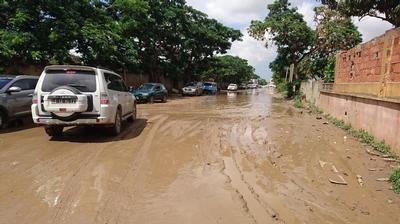
The most heart-breaking of all recent developments is the collapse of public health services. Not that it was ever good – Angola maintains one of the world's worst child mortality rates – but in 2016 the rainy season, litter and generalised poverty and unhygienic conditions, triggered a mass outbreak of malaria, yellow fever, dengue, chikungunya and acute respiratory and diarrheic diseases. Ever more children die in the hospitals because there is insufficient medical staff, electricity, medicine and equipment – but most do not even make it to the hospital. Outside every hospital, one can see the long lines of people waiting about in the sun in a vague hope of receiving treatment, and the agony in the eyes of family members who try to care for them. It is 2016, and people post on Facebook gruelling episodes of people dying from fever in overcrowded hospital beds or from giving birth without attendance on the hospital porch.
The chaos in Luanda’s hospitals is not the result of a massive refugee crisis, generalised famine or a natural disaster. This is the result of an oil economy where resources were mismanaged during the boom years, and where the Government completely failed to prepare for the inevitable bust.
Economic crisis rapidly taking its toll
“Everyone” seemed to have a story of family members or friends who have lost their jobs in the private sector. My friend's daughter worked in a supply company to the petroleum industry, but the company let half of the workers go since the state oil company, Sonangol, has failed to pay its contractors for months.
Beggars, of which the streets in Luanda were regularly “cleaned”, were now back in bigger numbers, but there were almost no Chinese to see! Had all the Chinese left along with the hundreds of thousands of Portuguese and Brazilian consultants? No wonder then there were few people in the restaurants. “We have less than half of the clients as that of a year ago”, said the waiter at our regular diner.
Traffic seems to have reduced to half too, people said, although that is probably an exaggeration. But the hikes in the fuel prices surely impacted on traffic. Not all for the worse, I thought.
The price increases affects people's wellbeing. In an impromptu debate with staff at our guesthouse, they all agreed that milk, sugar, bread, rice, cooking oil and other staple foods had increased to the double – at least. They backed it up with numbers. In the stores, many shelves are half-empty. Personally, I believe the official statistics that inflation is only at 15% a year hides a much higher figure.
Driving around Luanda, I saw literally thousands of building places that are unfinished, and there is no sign of activity. Foreigners are abandoning the posh Talatona suburb, leaving thousands of apartments empty. "I am alone on my floor now", said a South African engineer, "and the parking lot outside my building is empty, too". Even on the Talatona roads, the potholes are taking over.
Petty corruption – a symptom of decay
Angolans have endured a lot of hardship of violence and poverty during its short history. However, boom times eases your suffering with the hope that things will get better. Now one can see some worrying signs that the gloom of bust and little prospect of recovery is having some seriously demoralising effects. One of them is that the petty corruption seems to be escalating – at least people complain a lot more about it. The traffic police is still the most notorious. I have never seen so many officers on the street as this time. They used to direct traffic occasionally, but now they were unvaryingly talking to drivers at the roadside, often obstructing the flow of traffic. We could only presume they were negotiating the sum of their extraction. On a regular trip from Miramar to the UCAN we could easily spot up to a hundred officers involved in this activity.
“Tomás”, a taxi driver we often use, says police officers used to “beat around the bush” a lot before they eventually would accept a pay-off instead of passing a “multa” (fine). Now, they just go straight to the point and ask for the money. One morning he was in a hurry, he solved the matter literally in 30 seconds with 2000 kwanza (about USD 10). The officer had asked for a “saldo” (a reference to the value of a phone saldo/credit worth a 1000 kwanza, but since Tomás was in a hurry and just had a 2000 kwanza note, and there was no “trocos” (change), it was settled with two “saldos”. This is just another symptom that the government is behind in paying salaries – even to the police.
Tomás merely shrugged his shoulders at these “highway robbers” (the traffic police). What really frustrated him was a new development that hit his car wash shop in Talatona where he has invested his savings. One day some EDEL-guys (the public electric utility) had cut power at the car wash. Tomás protested that he could show the receipts that he had paid his electricity bill – and that in any case EDEL was not allowed to cut power unless three months passed without payment. He had to go to the “EDEL-office” which turned out to be a small company that EDEL has sub-contracted to take care of electricity billing and payment (we can only guess who owns such a company). In that office he was met by a clueless, chewing-gum chewing girl in a miniskirt. Annoyed with her incompetence and shitty “customer service”, he nevertheless went away with a phone number to the “technicians” who had cut his power-lines. He phoned them and argued his case. Twice they said they would reconnect his car washer, but it just did not happen. Of course, he knew what was going on. ‘Money, that’s it, they just want money’, so he called them and said: “Listen, I don’t have time for this, since my car wash plant can’t work without power. So I have prepared an envelope for you with 7000 kwanza”. A few hours later power was restored.
This kind of “everyday” corruption is not “greasing the wheals” as some scholars claim. Neither is it a “culture” that locals are at ease with. It frustrates them a lot, and they say it is getting much worse. It gnaws out the trust in their co-citizens, undermining solidarity. The garbage, the potholes, the disease and the corruption are symptoms of a country that is in the beginnings of its deepest crisis in peacetime – and it is threatening to destabilize the country again.
Will ordinary Angolans vent their anger at each other, or at the government and the rich with their accounts in offshore tax havens?
